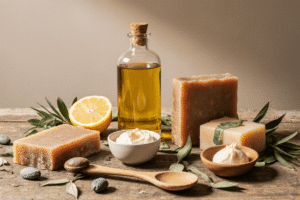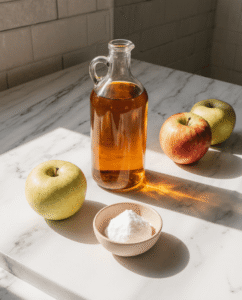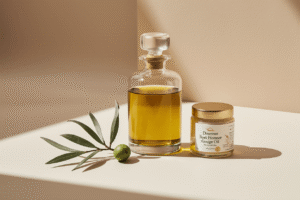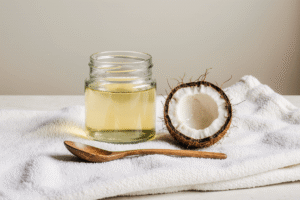The shift toward natural skincare is growing for good reason. Many synthetic products contain harsh chemicals. These substances can harm or irritate the skin. Using natural ingredients for skincare is a safer choice. They often work better and support healthy skin naturally. This article explores their benefits and key examples — olive oil, coconut oil, and apple cider vinegar. Each one shows how nature can outperform synthetic alternatives.

Why Choose Natural Skincare?
In online forums I observed many others making similar transitions. One user wrote:
“I dumped all my synthetic serums and began using just raw honey and a few drops of olive oil. My skin calmed down in a month.”
Stories like this underscore the appeal of natural ingredients for skincare: they feel simpler, gentler, and more trustworthy.
The Hidden Dangers of Synthetic Skincare
Many synthetic skincare products promise fast results, but often come with hidden risks. Chemicals in these products can strip the skin’s protective barrier, leading to dryness, redness, and irritation. Artificial preservatives and silicones may clog pores and prevent the skin from “breathing”. Over time this can aggravate existing skin conditions rather than solve them.
I remember using a high-end moisturizer that claimed “deep hydration”. At first my skin felt smooth and dewy, but within days I developed break-outs. My skin became dependent on the product: if I missed a night, dryness returned. After switching to natural alternatives I found my skin gradually regained balance without needing constant intervention. That was when I truly appreciated the power of natural ingredients for skincare.
Olive Oil: A Natural Moisturizer
Olive oil has been used for centuries to hydrate and protect the skin. It contains vitamins E and K. These nutrients help keep skin soft and healthy. The oil is also rich in antioxidants called polyphenols. They guard the skin from environmental damage. A clinical study compared extra virgin olive oil with petrolatum. Results showed that olive oil supports the skin barrier and surface texture in healthy adults. Another study shows olive oil’s polyphenols have anti-inflammatory and antioxidative properties in skin tissue.
From my own experience: I began cleansing my face in the evening using a teaspoon of EVOO, massaging gently and removing with a soft wipe. My skin texture softened, and after a few weeks my makeup sat more smoothly. My fine lines around the eyes (which bugged me) seemed less visible. I attribute this to using natural ingredients for skincare rather than synthetic chemicals.
That said: not all studies are entirely positive. One older study showed that topical olive oil reduced the integrity of the stratum corneum in some volunteers, and induced mild erythema — so it may not suit everyone. My rule: I patch-tested the oil behind my ear for three nights first, to confirm no irritation.
Coconut Oil: A Multi-Purpose Skincare Hero
Coconut oil is a powerhouse among natural skincare options. It contains lauric acid, which has antimicrobial properties and may fight acne-causing bacteria. Research also indicates that virgin coconut oil (VCO) improves skin barrier function, reduces inflammation, and has anti-fungal and wound-healing properties.
Here’s how I used it: During a chilly winter I developed dry patches on my calves and elbows — those rough, flaky zones. I switched to applying half a teaspoon of VCO each night, massaging until absorbed. Two weeks in, the roughness had smoothed out and no flakiness returned. I also used it as a gentle makeup remover: the oil dissolves mild foundation and leaves a residual protective film on the skin overnight.
In an online skincare group a member shared:
“I have eczema and I started using virgin coconut oil on my arms instead of steroid cream. My flare-ups still happen but they are less intense and I feel less sting.”
These anecdotes reinforce how natural ingredients for skincare like coconut oil can serve multiple purposes: moisturizer, cleanser, and treatment adjunct. Be mindful: for face use I apply only on my cheeks (which tend to be drier) and avoid my T-zone as coconut oil can be comedogenic for oily/acne-prone skin.
Apple Cider Vinegar: A Natural Skin Balancer
At first glance the idea of using something acidic like apple cider vinegar (ACV) on your skin may seem odd — but it offers real benefits when used carefully. ACV helps maintain the skin’s pH balance, supporting a strong protective barrier. It also contains natural alpha-hydroxy acids that gently exfoliate dead skin cells and brighten the complexion. In a small study involving subjects with atopic dermatitis, dilute ACV soaks were tested; while results were mixed and some irritation occurred, the idea of barrier acidification remains intriguing.

Here’s what I did: I mixed 1 part ACV with 4 parts distilled water (a standard safe ratio) and used it as a toner on my forehead and chin twice a week after cleansing. I noticed fewer clogged pores and an evening out of my skin tone after around three weeks. On a forum a user wrote:
“ACV as a weekly toner has replaced my old astringent. My breakout days are fewer and my skin feels calmer now.”
That’s the benefit of natural ingredients for skincare: they can shift your routine from reactive to preventive, from harsh treatments to gentle maintenance.
Important caution: Because ACV is acidic, it must always be diluted before application and patch-tested. A clinical pilot study published in Pediatric Dermatology (University of Virginia, 2019) found that daily 0.5% apple cider vinegar soaks did not improve skin barrier function in patients with atopic dermatitis and often caused mild irritation or burning sensations in over 70% of participants. The authors concluded that while ACV temporarily acidified the skin, it offered no therapeutic benefit and may increase transepidermal water loss (TEWL) in sensitive skin types.
Natural vs. Synthetic Skincare: A Balanced View
When choosing skincare, focus on long-term safety and results. Synthetic products often promise quick fixes. They may brighten, smooth, or firm the skin. Yet these effects come from strong chemicals. Such ingredients can disturb the skin’s natural balance. Natural ingredients for skincare work differently. They help the skin repair its barrier and stay nourished. They also support antioxidant defense and microbial balance.
During my own transition, I replaced my harsh face wash with raw honey. I used aloe vera as a gentle moisturizer. After one month, my skin felt smoother and calmer. Breakouts became rare. I no longer needed strong, “performance” products. My dermatologist noticed the change too. She said my skin barrier looked stronger. One night I skipped everything and used a bit of olive oil. In the morning, my skin still looked fresh. That was the moment I felt the shift.
That said — natural doesn’t always mean perfect or risk-free. For instance, while olive oil has many positive effects, some research suggests it may damage the skin barrier in certain conditions. And coconut oil, while excellent for dry skin, may clog pores in acne-prone individuals. So it’s important to personalize your routine.
Transitioning to Natural Skincare
Switching your routine to focus on natural ingredients for skincare requires patience. Your skin may go through an adjustment period — temporary break-outs, changes in texture, mild irritation — as it adapts from a chemical-heavy regime to a gentler, natural one. I experienced a mild flare-up in week two (likely the “purge” phase) but within week four things settled and improved.
Here are some guidelines to smooth the transition:
- Introduce one change at a time (e.g., replace cleanser first, then moisturizer) to monitor how your skin reacts.
- Keep hydration steady — drink water, use a humidifier if needed, even when using “lighter” natural products.
- Patch-test any new oil or toner for 3 nights behind your ear or inner arm.
- Record your skin’s condition in a journal or photo log so you can track improvements.
- Be gentle: no strong exfoliants or acids while the barrier is repairing.
Simple Ways to Start Using Natural Skincare
Here are a few simple steps to introduce natural skincare into your routine:
- Use natural oils like olive or coconut oil instead of synthetic heavy-cream moisturizers.
- Try diluted apple cider vinegar as a toner (e.g., 1:4 ratio with water) to balance pH and reduce break-outs.
- Make DIY face masks with honey, avocado, oats or yogurt for added nourishment.
- Replace harsh cleansers with gentle options like raw honey or aloe vera gel.
- Swap synthetic serums with botanical alternatives (e.g., green tea extract, calendula).
These small changes made a huge difference for me. I no longer rely on expensive chemical-laden products. My routine is simpler, calmer, and more effective. I feel confident I’ve embraced natural ingredients for skincare in a meaningful way.
How Natural Skincare Helps the Environment
Beyond personal benefits, natural skincare also tends to be more eco-friendly. Many synthetic products come in non-recyclable packaging and contain chemical by-products that pollute water sources. Natural ingredients often break down more easily, and brands that use them tend to offer sustainable, recyclable packaging. By choosing natural skincare you are making a small but meaningful step toward a healthier planet.
Nature’s Gift to Your Skin
Research also supports the benefits of natural skincare. For example, a study on EVOO shows that its phenolic compounds contribute to wound healing and fibroblast action in skin tissue. Another review found that virgin coconut oil is beneficial for dermatological disorders, with anti-bacterial, anti-inflammatory, wound-healing and barrier repair properties. Even though research on ACV is more cautious (and sometimes mixed) the concept of skin acidification and exfoliation remains promising.
So: natural skincare isn’t just an alternative—it can be a better choice. These ingredients nourish, protect and heal the skin without the risks of synthetic chemicals. Olive oil, coconut oil, and apple cider vinegar exemplify how natural ingredients for skincare can provide long-lasting results without harmful additives.
By choosing natural skincare you invest in healthier skin while helping the environment. My own experience with natural products has been life-changing, and I encourage others to try this approach. With time and consistency, natural ingredients can transform your skincare routine, giving you healthy, glowing skin. Give your skin the care it deserves—the natural way.
Common Skincare Myths Perpetuated by the Beauty Industry

I’m Victoria, the creator behind Eva My Balance. Passionate about beauty, wellness, sustainable living, and mindful self-care. My mission is to inspire you to live consciously and beautifully—inside and out.




